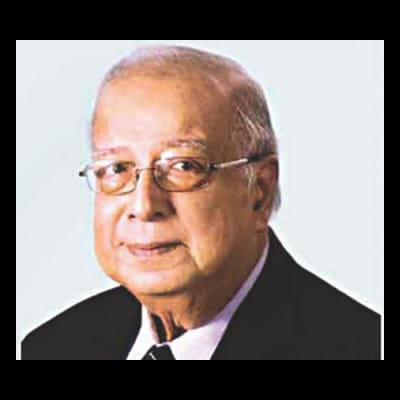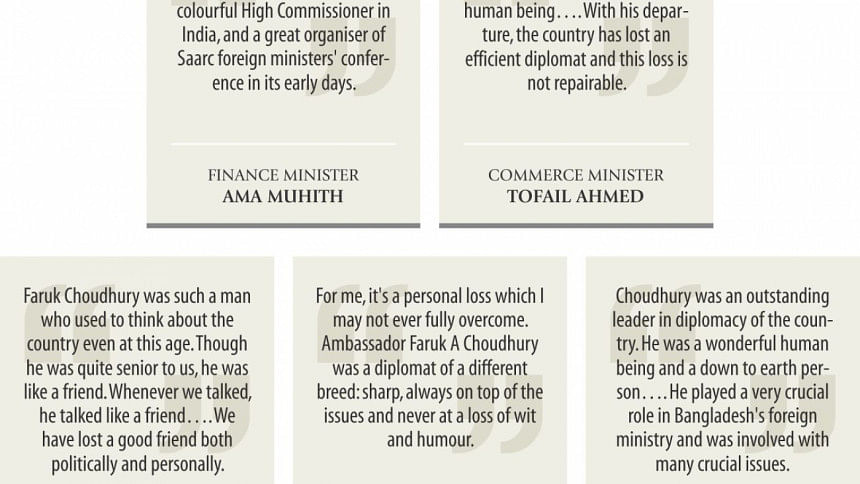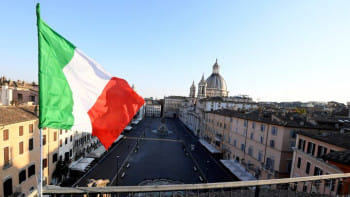Tribute: A man one couldn't help loving

I did not know Faruq Ahmed Choudhury the diplomat, though I heard he was among the best that there could be – I will let others write about his professional achievements. My knowledge of Faruq Bhai, the strong supporter of the independent media, and Faruq Bhai the 'ultimate' modern Bengali is personal and intimate.
I first met Faruq Bhai when I went to see him in New Delhi where he was the High Commissioner. He agreed to see me briefly--more because of a reference from his friend SM Ali than for anything else. His height, his physique and his reputation overwhelmed me. I was really lost for words which he helped me overcome with his natural amiability. This was the beginning of a relationship of mutual admiration and affection-admiration from my side and affection from his that lasted till the very end.
He rejoiced when democracy was restored in Bangladesh in 1991. His rejoice reached greater heights when he saw his childhood friend SM Ali start The Daily Star with a promise of independent journalism. I knew of his personal interest in the affairs of the newly launched paper as Ali Bhai would frequently refer to him in his conversations with me.
His natural affinity to democracy and liberalism made him an instinctive adherent of the free media. He truly believed diversity of views is a fundamental source of social capital and the surest guarantor against authoritarianism. He had learnt from his vast experience of other countries that however well intentioned a government was, it could never be the repository of all knowledge and hence it had to listen carefully to the voices of the people, especially the critical ones, for only those who spoke fearlessly spoke with utmost sincerity.

It was his core belief that governments, even those sincerely devoted to the welfare of the people, were never harmed by criticisms, however harsh. When many in a society spoke out loudly-- environment permitting-- the few with vested "agenda" were forced to step back.
Faruq Bhai knew from experience that developing countries repeatedly erred on the side of authoritarianism sometimes from a genuine impatience with democracy-- as everything took more time when either consensus or large scale support were needed to be built--but more often because they found public support too hard to garner or retain as they surrendered to vested interest or developed their own.
But he believed, as all of us freedom fighters did, that Bangladesh need not go the way of authoritarianism. He was greatly pained when it did.
When the chance to rebuild democracy came, after the fall of Gen. Ershad, he energised himself and joined all those who were working to make it a reality. At one stage he joined the Awami League in an advisory capacity as he, being a wholehearted believer in the spirit and values of our Liberation War, held the view that the party of Bangabandhu, now led by his daughter, would be his means to contributing to strengthening democracy in Bangladesh. Finding his efforts stymied, he became inactive, and later withdrawn.
His irrepressible desire to serve the nation prompted him to join Brac as an advisor after his retirement, in which capacity he contributed wholeheartedly to the worldwide success of this unique and worthy institution that has made Bangladesh a household name in the global struggle to eradicate poverty.
To me, he was a model of a modern Bengali, highly proud of his cultural identity and yet open to the world to eagerly learn everything that would make our culture, our people and our country better. He was a very refined person as evidenced by his love for literature, music, and painting from both home and abroad.
He was truly a global citizen in his love for food, a gastronome. He would travel the world to dine at the best restaurants. He was the only person I heard saying that he was going to Paris, of course to visit the museums, but also to dine in those exquisite places that only Paris had.
He was a sincere friend of The Daily Star. His love affair with this paper started of course with his friend, SM Ali, but continued over the years not only because of what we tried to do but more importantly because of what we tried to stand for. His worldwide experience taught him the values of free media and as such, he stood for its success in the country that he loved so much.
There were countless moments of advice and encouragement that I had the honour to receive from him. He felt personally proud when we succeeded and deeply pained when we failed. He was a tremendous source of courage and consolation during my most challenging days in leading this newspaper for which I will forever remain indebted to him.
With im we lose a man of knowledge, culture, sophistication, courtesy, dedication and warmth. He loved life and in turn life--in the form of all the people who came into his contact--loved him.

 For all latest news, follow The Daily Star's Google News channel.
For all latest news, follow The Daily Star's Google News channel. 



Comments